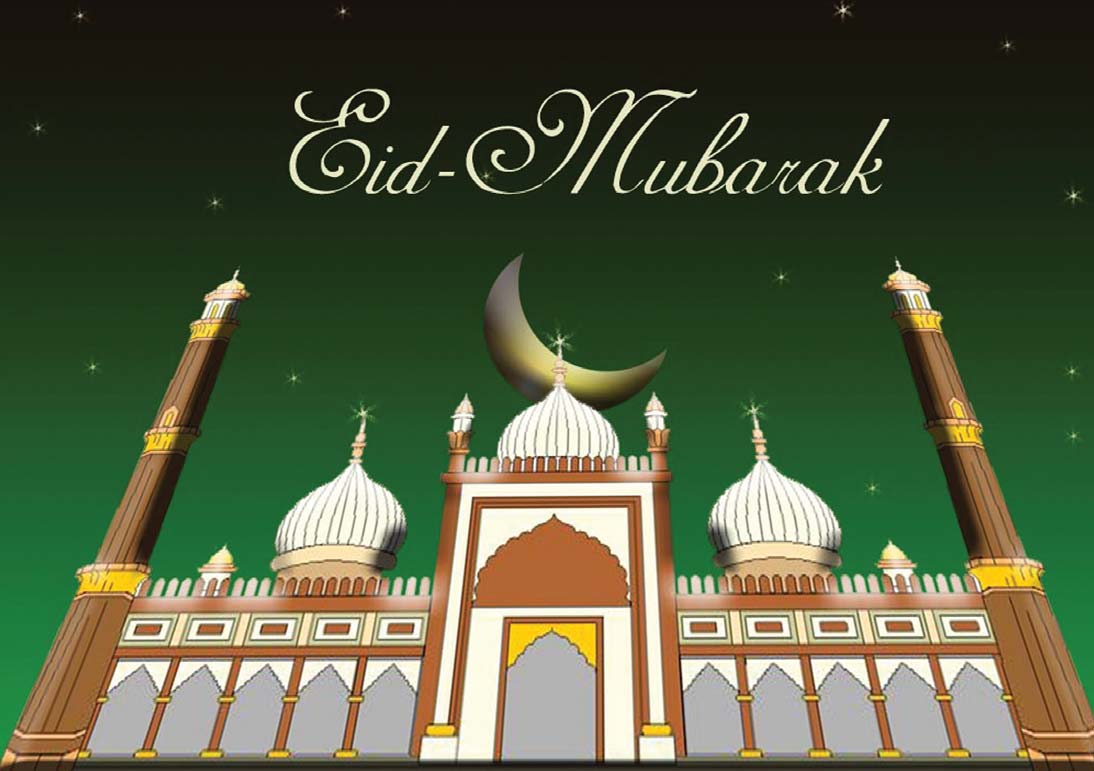
Eid ul-Fitr is one holy festival for Muslims, which marks end of Holy Month, Ramadhan. It is an Arabic word, juvenile amalgamation of Eid and Fitr, which means festivity and the breaking of fast, respectively. The festival is celebrated on the conclusion of the fasting during the month of Ramadhan. This joyful and blissful day is celebrated to give thanks to Almighty for his blessings in the holy month of Ramadhan.
Muslim grace with presence at the congregational prayer service that held in the morning. Eid-ul-Fitr has a meticulous Islamic prayer, which consists of two raka’ah or simply units in a large hall or an open field. Muslims of all age group wear new clothes, cook some delicious and tasty food, and invite relative, friends and neighbors to celebrate the auspicious day with them. Fasting in Ramadhan encourages sympathy for needy and hungry and motivates Muslims to donate very generously to all underprivileged.
According to Muslim belief, they are commanded by Almighty God to do the fasting until the conclusion of Ramadhan as mentioned in Holy Qur’an and also pay Zakat-al-fitr before offering the Eid prayer. The Eid Festival is a joint effort of varied community organization from the Detroit/Dearborn Metropolitan area, to swarm a cultural, educational and entertaining and educational occasion for the community all through the yearly celebration of Eid-ul-Fitr. Eid-ul-Fitr is a celebration concluding the Islamic blessed month of Ramadan, in which Muslims are required to fast in all days of Ramadhan from dawn to dusk, refraining from beverages, foods, assisting the underprivileged and engaging in some kind of community services. The advantages of this form of fasting helps in strengthening and increasing moral character, appreciating the everyday blessings of food and beverages, and sympathizing with the person who are less fortunate or underprivileged. In the social sense people celebrate Eid-ul-Fitr by visiting to relatives and neighbor homes and exchanging warm greetings like ‘Eid Mubarak’.
The exchange of such kind of greetings is part of cultural tradition and not the religious obligation. Before the arrival of Islam in the Arab world, there is a talk about Eid festival as yawn al-sabasab and yawn al-sab and some other mentions among the Arab. The Israelites had also festivals as well but it is evident from Old Testament and some other scriptures that these festivals ascertained more to commemorating certain days of history. The festival Eidul- Fitr was first originated by the last prophet of Islam, the Prophet Muhammad and occur on the first of month of Shawwal, after the end of holy month of fasting, the Ramadhan, in which Muslims undergo fasting for a period of one month.
History According to convinced Ahadith, these pious festivals were instigated in Madinah after migration. Anas reports that: When the Prophet Muhammad arrived at the city of Madinah, he found some people celebrating two explicit days in which people used to amuse and entertain by merriment and playing. Prophet Muhammad asked people regarding the nature of these sorts of celebrations and merriment at which people responded that these festivities were occasions of recreation and fun of days of jahilliyah. At this point, the Prophet Muhammad remarked that the Almighty God has set two days of holidays instead of these festivities for people, one is Eid-ul-Fitr and the other one is Eid-ul-Adha. All Muslims fast on daily basis every year in the holy month of Ramadhan from dawn to the dusk. Fasting involves abstaining from beverages, food and sexual relations.

By withholding from some of the carnal and basic desires and needs, Muslims develop self-discipline or self-control: the ability to prevent from doing something one deeply and intensely desire, purely out of compliance to the Creator. This monthlong exercise of fasting helps in developing and strengthening to live a life of wholesomeness and obedience to Almighty God regardless of the lure towards sin. Those people who are sick, traveling, and elderly or women who are nursing and pregnant are allowed to break the fast and cover up the missed days of Ramadhan at some later time. If they are incapable to do this later, they must provide food to a needy one for every missed day. Children are obligated to begin their fasting from the very age of puberty.
Even though fasting is advantageous to health, it is considered chiefly as a way of spiritual self refinement. According to history, Eid-ul-Fitr is a festival which has its own essence of merriment and enjoyment and this activity is dated back to many centuries. It is being celebrated with much zeal and warmness all across the world but as the time have changed now, the ways and customs involving Eidul- Fitr has also changed but the basic idea of festivities remains the same.
According to Muslim belief, they are commanded by Almighty God to do the fasting until the conclusion of Ramadhan as mentioned in Holy Qur’an and also pay Zakat-al-fitr before offering the Eid prayer. There are lots of things which revolve around this festivity. Fasting is believed by some scholars to praise fundamental distinctions and lauding the power of religious realm, while admitting the subordination of physical realm.




Be the first to comment